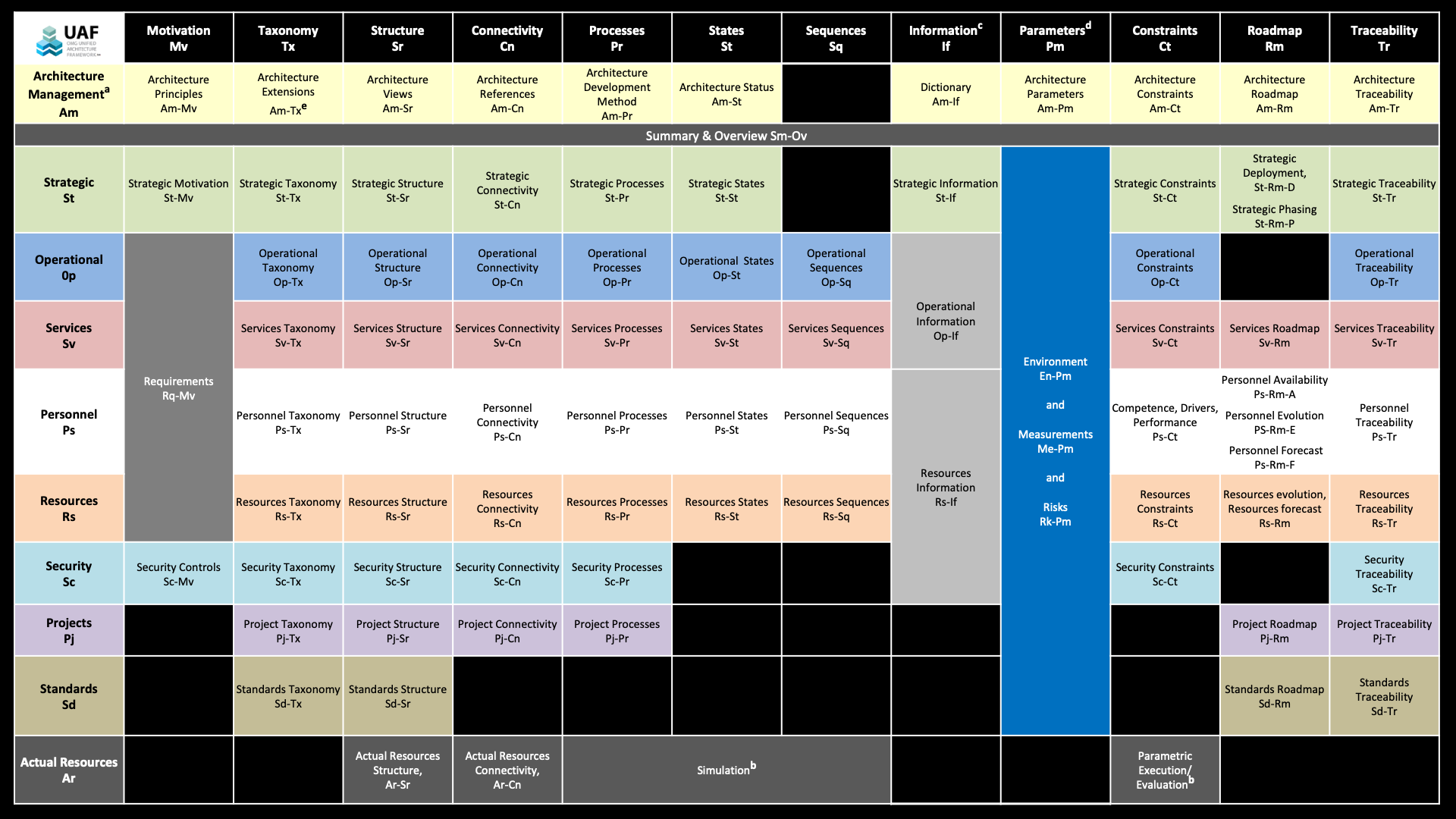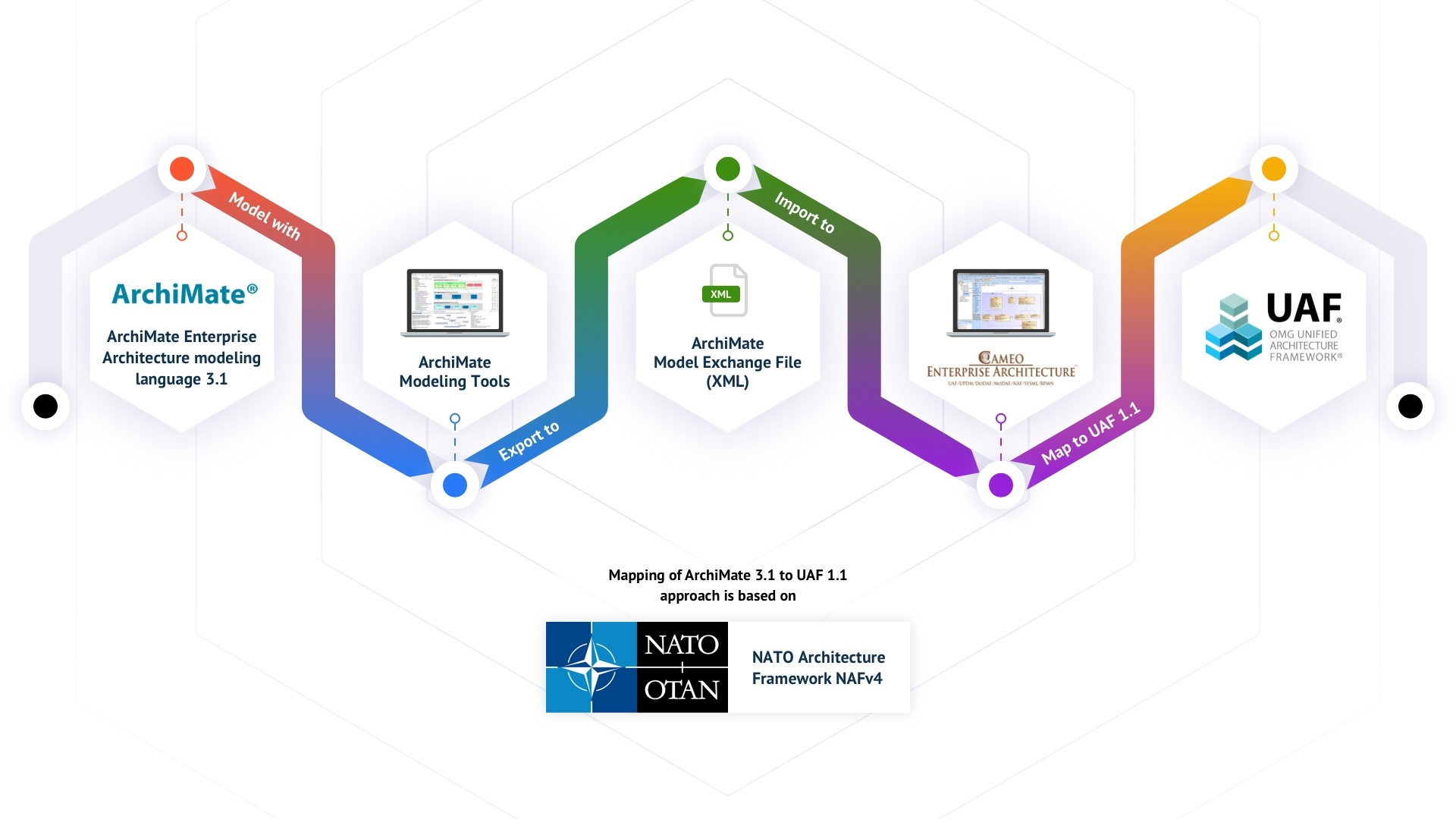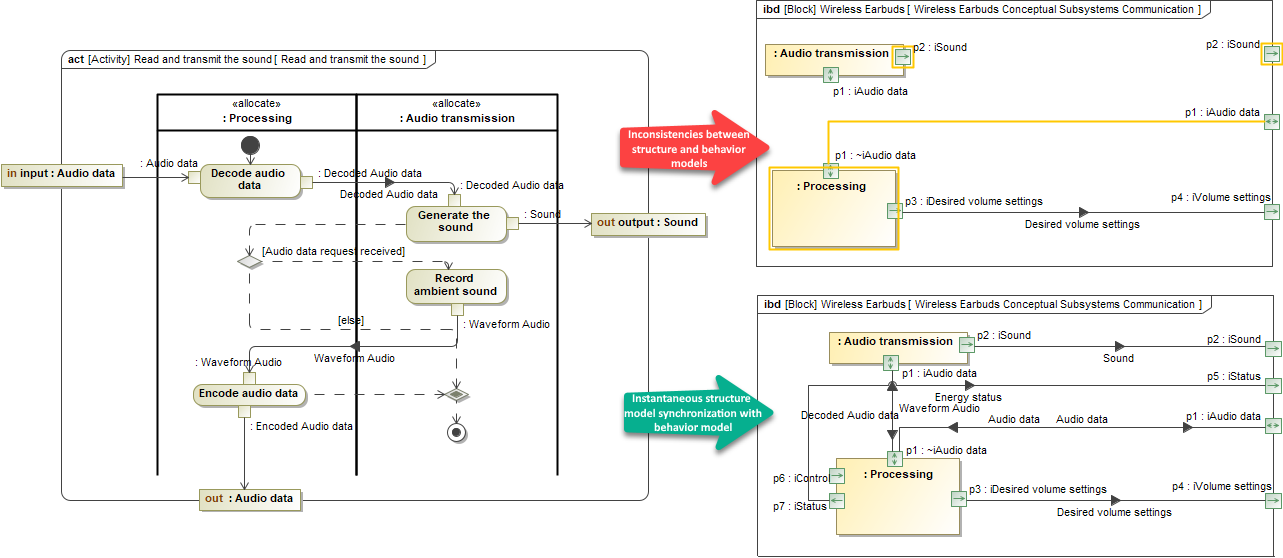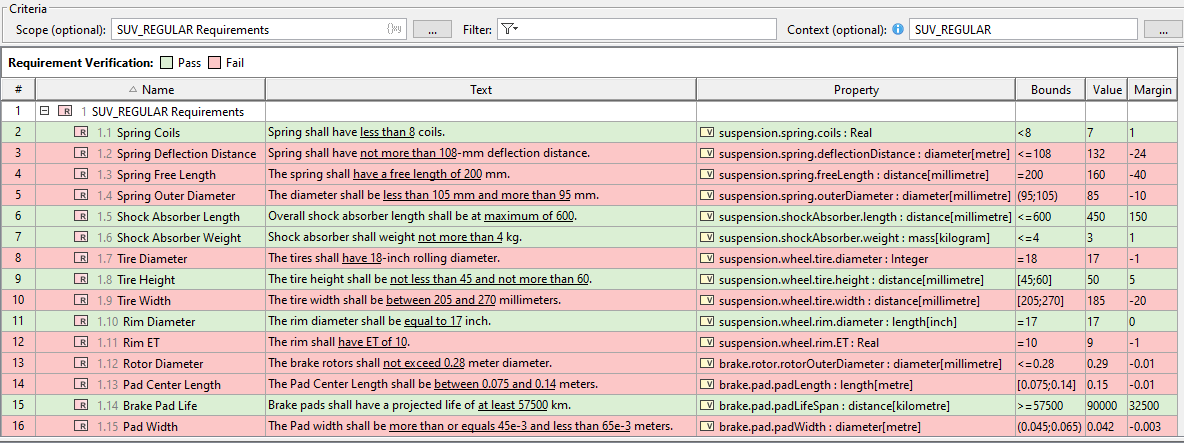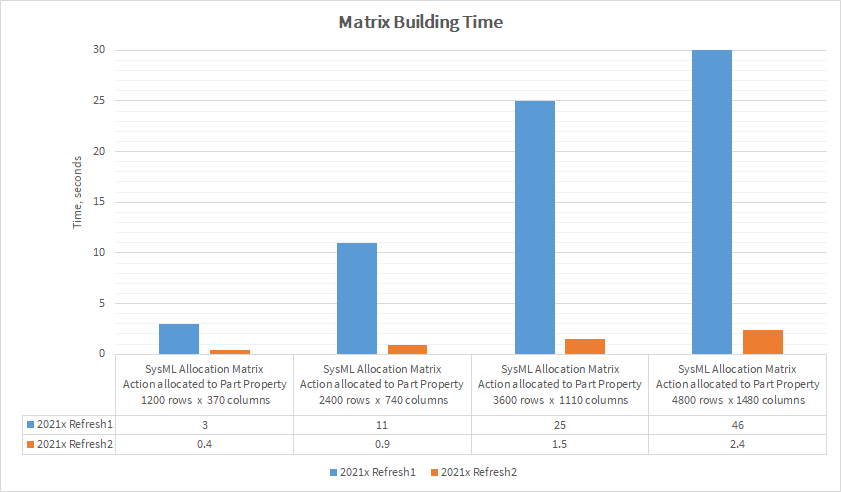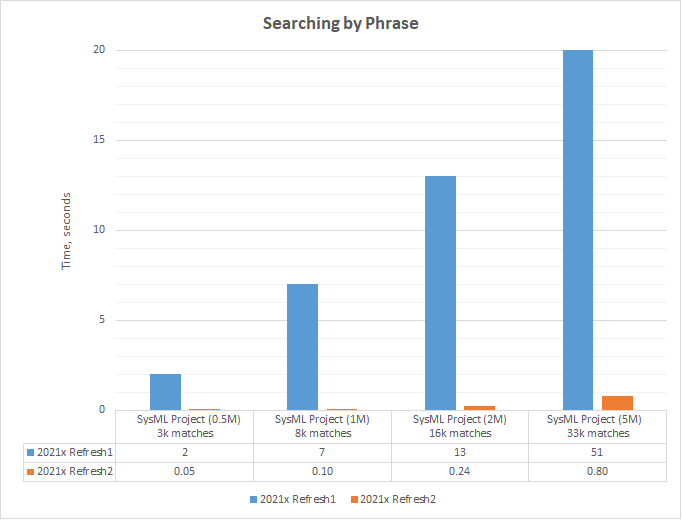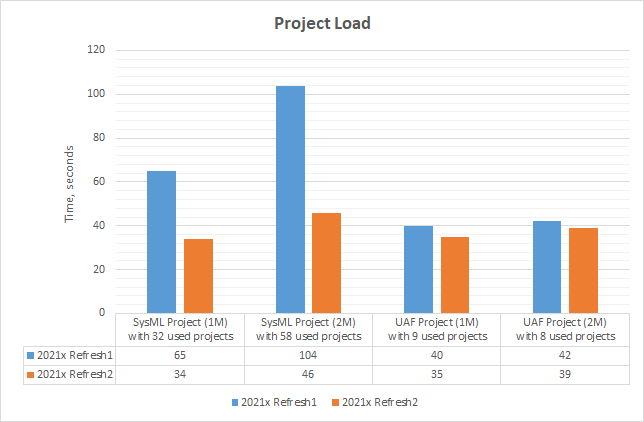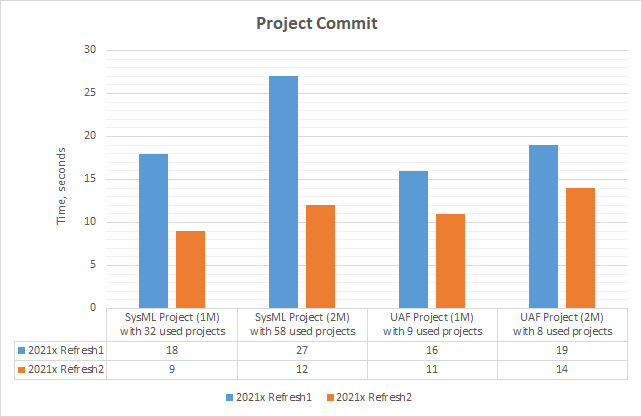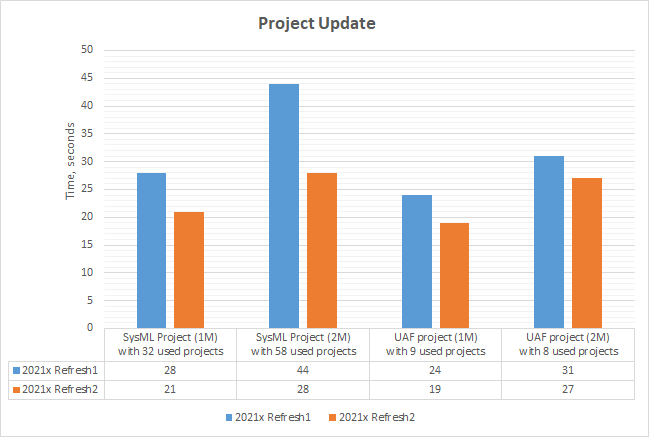Released: December 3, 2021
To download the latest version, see Downloading installation files. Don't forget to give us your feedback on LinkedIn, Twitter, or Facebook. For further information, check the product documentation.
UAF Features
UAF 1.2 Support (Technology Preview)
In 2021x Refresh 2, the UAF 1.2 support is introduced as a technology preview.
For this release, the separate UAF 1.2 Plugin is included in Cameo Enterprise Architecture and Magic Systems of Systems Architect modeling tools. This plugin is only for preview purposes and should NOT be used in production.
What is implemented for this release:
- UAF 1.2 Profile support, however, it is supported only in the UAF framework
- Migration from UAF 1.1 to UAF 1.2
- UAF Grid and Metamodel Improvements:
- Architecture Management Domain
- Improvements in Strategic and Services Domains (clarify semantics, add new concepts, improve exposition)
- Support of Value Streams
- Risk becomes a cross-cutting construct
See the UAF 1.2 Plugin documentation >>
The development will continue for the upcoming releases and will focus on the fully UAF 1.2 support for DoDAF, DoDAF 2.0 MODAF, NAF, and NAF 4.0 frameworks and migration from UPDM to UAF 1.2.
UAF 1.2 grid.
(Click the image to enlarge)
ArchiMate Model Import (Technology Preview)
In this version, we continued working on the import of the ArchiMate model from the open exchange file into the UAF project. The imported element mapping is still only partial, but more mapping options were implemented. The mapping of ArchiMate 3.1 to UAF 1.1 approach is based on the NATO Architecture Framework. Learn more >>>
SysML Features
Behavior-to-Structure Synchronization
The Behavior-to-Structure Synchronization has undergone further improvements to enable you to completely synchronize the entire structure model with the behavior model. First, the set of validation rules has been extended by introducing the brand new validation rules for the detection of missing Connectors and Item Flows. That is not all! You can now automatically build the structure model according to defined Activities and, at the same time, generate an Internal Block Diagram by executing a single-click command.
Checking the consistency of the Internal Block Diagram with Activities and then handling detected inconsistencies using solvers.
Learn more about behavior to structure synhronization>>
Requirements Verification in Table
The Requirements verification can now be performed directly in the Requirement Table. The analysis is carried out by evaluating whether the value of the property satisfying the Requirement is within a range of lower and upper bounds extracted from the Requirement text. Additionally, the automatically calculated margin value helps to determine how close the system model is to fulfilling Requirements.
Performing the Requirements verification analysis in the Requirement Table.
Learn more about Requirements verification>>
Modelica Enhancements
Importing from Modelica file
In this version, the Modelica import was enhanced. Previously, only Modelica Library import was available. Now you can import the Modelica file (*.mo) content into the single selected Block of your SysML model. During the import, context-specific initial values can be updated or missing classifiers can be created. Furthermore, connector, property, and port changes are also supported.
Learn more about Modelica import >>
Extending models with Comments
You can extend the model generated as a Modelica code, using a Comment element with the «ModelicaExtension» stereotype. The Modelica Extension content is exported to the Modelica file together with the model. As a result, the code is generated depending on where the Comment is attached.
Learn more about extending the model >>
Other Enhancements
- The Autowiring command was renamed Autowire Parts. You can find this command in the IBD diagram toolbar, Tools menu.
- The Autowire Parts, Delegate Port(s), and Behavior to Structure Synchronization commands have been grouped under Tools in the diagram toolbar.
You can now easily check if the Item Flow realized by the Object Flow is compatible with Pin types in a SysML Activity Diagram.
You can now easily check the sent Signal compatibility with the Proxy Port specified in the On Port property of the Send Signal action or the compatibility of the accepted Signal with the Proxy Port specified in the Port property of the Accept Event action in a SysML Activity Diagram.
Performance Improvements
Client-side Performance Improvements
Dependency Matrices. Experience enhanced in matrix building performance. From now on, large matrices are built up to 20 times faster compared to 2021x Refresh1.
A chart comparing the SysML Allocation Matrix building time in 2021x Refresh1 and 2021x Refresh2 projects.
Find. Now you can perform a search by phrase in the model 40-70 times faster compared to 2021x Refresh1. This is applicable to Find and Find and Replace dialogs as well as the Find operation used in Structured Expressions (e.g., Derived Properties, Smart Packages, Tables, Matrices, etc.)
A chart comparing the search by phrase time in 2021x Refresh1 and 2021x Refresh2 projects.
- Element selection dialog. Further performance improvements have been introduced to element selection (i.e., the Select Element dialog and drop-down lists). The element search can now be performed instantly when using Filter By Package Imports for context-specific type selection.
Teamwork Cloud-related Performance Improvements
Performance Improvements Under Slow Network
Performance improvements have been implemented to optimize working with Teamwork Cloud projects containing a set of used projects in slow network environments (ping time >115 ms).
A chart comparing the Project Load, Project Commit, and Project Update operations speed in slow network environments.
Integrations
Effectivity Import for TRM Requirements
Requirements from the TRM application on the 3DEXPERIENCE platform can be imported/synchronized into the modeling tools using Cameo DataHub. With 2021x Refresh2, DataHub can also import the effectivity markings of the requirements as equivalent variation points in the modeling tools.
The MagicDraw PLE mechanisms (variant highlight, variant realization transformation) can then be applied to these variable requirements.
As a prerequisite for effectivity import, Model Version variability and configurations have to be imported beforehand. Learn more about importing variability data >>
Note. The effectivity import is unidirectional. You can import from the 3DEXPERIENCE platform to the modeling tools.
Modeling and Infrastructure
Tree View in Select Element Drop-Downs and Quick Find
Quick Find and Type Selection drop-downs have been enhanced with the Tree view. In cases when multiple elements share the same name, it will no longer be confusing as to which one to select: all you need to do is switch to the Tree view to identify the element's place in the model hierarchy.
Switching between the Tree and List views to find the needed element faster.
Other improvements
- The 3DEXPERIENCE menu item groups all available integrations with the 3DEXPERIENCE platform. When you install plugins that support integration with the platform, all their available functionalities will be added under the 3DEXPERIENCE menu. Learn more about authentication with the 3DEXPERIENCE platform >>
Since the UsageInDiagrams Opaque Behavior is a time-consuming operation (it loads all diagrams - matrices, tables, and maps), it has been deprecated and replaced with the UsageInDiagramsWithSymbols Opaque Behavior that searches for symbol usages only. Learn more about built-in operations >>
Key Issues Fixed
The following key issues have been fixed with this version:
- Improved performance - Smart Packages that fall within the tracking scope are no longer automatically calculated when the Suspect Links > Show Suspicions command is executed.
- The problem with Java sign-in is solved and the modeling tool now launches on macOS Big Sur without warnings.
- The project update no longer fails when the standard profile has no internal version specified.
- The modeling tool no longer becomes unresponsive when the element search is in progress.
- The diagram is no longer scaled incorrectly on mouse click/drag.
- The filtered changes are now accepted/rejected recursively when performing the merge operation.
- The information in structured expression queries is properly updated when adding projects to Teamwork Cloud.
- The element refactoring no longer fails when the Legend item is applied.
- The applied Legend item adornments are no longer removed after saving a Teamwork Cloud project locally.
- The Diagram Info box in the diagram no longer changes its position after performing the merge operation.
- Action pins no longer remain synced to Activity when the action behavior is unset.
- Associations are no longer moved when centering Classes vertically.
- The modeling tool no longer freezes when publishing large projects to Teamwork Cloud.
- When two different custom prefixes are applied for two different sets of elements, the element renumbering no longer works incorrectly for the set of elements with one custom prefix.
Discontinued Products
CSV Import Plugin support will be discontinued from the next major version. Excel/CSV Sync or Excel/CSV Import features will be replacing the CSV Import Plugin.
Collaboration
Global Element Usage Search
No more accidental Recovered Elements and unexpected surprises when updating Used Project versions! The latest release introduces the global element usage search functionality that allows you to query for the usages of the element you are about to modify or delete. Depending on the server-side configuration, projects using the element in question can be returned either from the entire Teamwork Cloud repository or the chosen custom indexed scope.
Searching for element usages within the Teamwork Cloud repository.
Learn more about global element usage search >>
Nested Categories
Do your projects need to be grouped hierarchically? Are you seeking to organize them in a folder-like manner? We have a solution! You can now organize your projects into nested categories so you can find them later with no difficulty.
Organizing server projects into nested categories.
Representation of Teamwork Cloud Users
You now have the freedom to customize how individual Teamwork Cloud users are represented in the modeling tool (for example, when they lock elements) by simply changing the value of the Representation of Users environment option. It is your choice whether a User Name, a Full Name, or an Email address is shown to identify them.
Changing the user representation in the Teamwork Cloud project.
Learn more about representation of Teamwork Cloud users >>
Returning to Merge Dialog
Need to make some adjustments after finishing the merge operation? Not a problem! You can now quickly return to the previously performed merge operation if you notice that you have accepted or rejected the changes (e.g., rejected the element creation) by mistake and need to change your merge decisions.
Returning to the Merge dialog to change merge decisions.
Learn more about returning to Merge dialog >>
Other Teamwork Cloud-related Improvements
Filters in the Merge dialog have been redesigned to improve the user experience.
- Updating a server project with local changes in disconnected team collaboration now handles the Used Project branch deletions more effectively, with no errors.
Report Wizard
Groovy Tool now supports use of relative paths, apart from Groovy file names and absolute paths, starting from the template to the Groovy file. Learn how to deploy this feature >>
- Report Wizard 2021x Refresh1 allows specifying DPIs of images in generated reports at three levels: global, template, and object. Learn more about this helpful function >>
- Warning messages can be enabled and disabled through setting the Report Environment options in addition to editing the config.xml. Find out more about disabling/enabling warning messages through the Report Environment options >>
- The Web Publisher 2.0 template can now show applied stereotypes of elements in the Containment tree. Learn how to utilize this function >>
- An increasingly effective utility of the Presentation Report Designer diagram has been ultimately designed for designing and generating PPTX and ODP templates. Discover Presentation Report Designer more >>
- With $report.getMetaClass($element), you are able to acquire a metaclass from a specific stereotype element. Learn about this function more >>
- The SVG image format is more inclusively supported for text, HTML, DOCS, and DOCBOOK templates for report generation. Learn more how to achieve this capability through the user interface >>
- The Dialog tool has additionally applied the capability of hiding element icons to the Sort and Enable and Selection dialogs. Discover further detail of its applications >>
- You can now use both the relative and absolute paths of the image file on your system to display it as a homepage image by utilizing the HomeImage variable of the Web Publisher 2.0 template. Know more about how this function works >>
- A new creation of the loadmodule command deployed with the Generate command helps load all unloaded modules while opening MagicDraw projects. Get familiar with loading all unloaded modules >>
- The exported image scaling option for Web Publisher 2.0 reports has become available in Report Wizard 2021x Refresh1, so that you can reduce, maintain, and enlarge the image size percentage. Find out how to make use of this option >>
Version news of servers and plugins
Cameo Enterprise Architecture documentation
News of earlier versions

